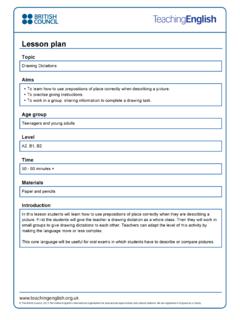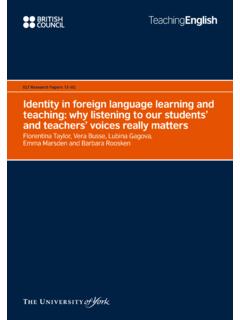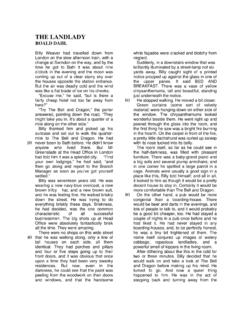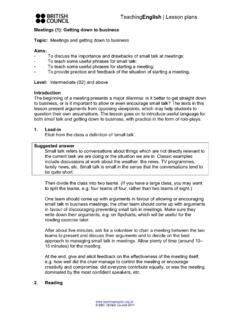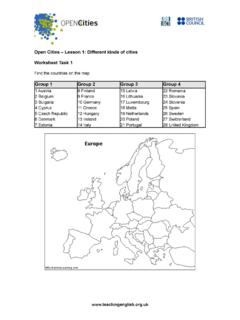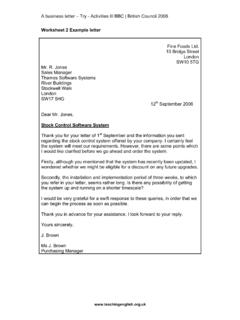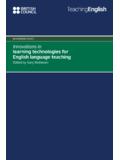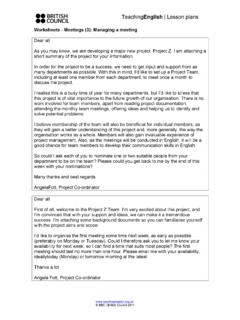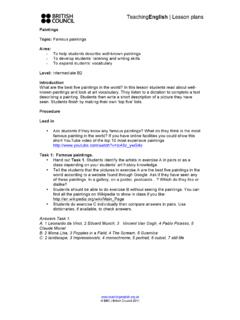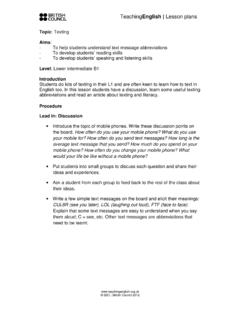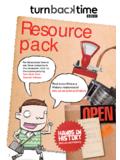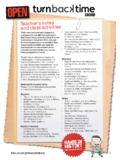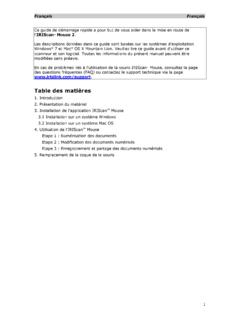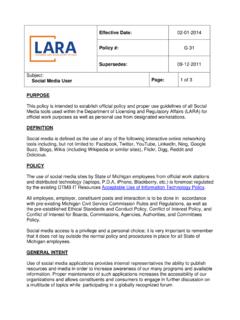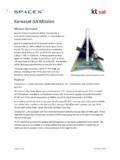Transcription of Open Cities – Lesson 1: Different kinds of cities
1 open Cities Lesson 1: Different kinds of citiesTopic: European Cities Aims: To develop students skills communication skills To develop students vocabulary around the topic of Cities and how to describe them To help students understand some of the issues and opportunities involved in moving to a new countryLevel: Intermediate +IntroductionThis Lesson plan explores some of the issues associated with cultural and environmental adjustments and looks at some of ways in which these have impacted on the lives of migrants in Different Cities and countries. This is a strong underlying theme of the OPENC ities project Write the names of these Cities on the board: Dublin Cardiff Madrid Tell students to imagine they are going to live and work in another city.
2 They should choose one of the Cities on the board but keep it a secret. Write these jobs on the board: Hotel receptionist Teaching assistant Nurse Students should choose a job and keep it secret. Ask students to decide how long they are going to stay in their chosen city. They can choose between 6 months, one year and forever. Students should write their three secret answers on a piece of paper without showing anybody. They then walk around the classroom trying to find a classmate who has made exactly the same choices. They need to ask and answer questions like: Where are you going? What work are you going to do? How long are you planning to stay?1 When they find the person with answers closest to their own they should sit together and discuss why they chose those countries In pairs or small groups ask students to brainstorm a list of European countries.
3 Give students a limited time of about 3 5 mins to do this. When they have finished, ask the pair or group with the most countries to read out their list. The other students should listen to see if they have any countries that the winning group has : This is a good time to listen and check the pronunciation of the countries Get other students to call out any countries they think the winners missed. Then ask the students to check against this list of countries (from Worksheet Task 1) to see which ones they missed countries1 Austria 2 Belgium 3 Bulgaria 4 Cyprus 5 Czech Republic 6 Denmark 7 Estonia 8 Finland 9 France 10 Germany 11 Greece 12 Hungary 13 Ireland 14 Italy 15 Latvia 16 Lithuania 17 Luxembourg 18 Malta 19 Netherlands 20 Poland 21 Portugal 22 Romania 23 Slovakia 24 Slovenia 25 Spain 26 Sweden 27 Switzerland28 United Kingdom Now split the class into 4 or more groups and give each group a list of some of the countries and ask them to find those countries on the map.
4 They should write the number on the : You could make this a raceWorksheet Task 1 Find the countries on the mapGroup 1 Group 2 Group 3 Group 41 Austria 2 Belgium 3 Bulgaria 4 Cyprus 5 Czech Republic 6 Denmark 7 Estonia8 Finland 9 France 10 Germany 11 Greece 12 Hungary 13 Ireland 14 Italy15 Latvia 16 Lithuania 17 Luxembourg 18 Malta 19 Netherlands 20 Poland 21 Portugal22 Romania 23 Slovakia 24 Slovenia 25 Spain 26 Sweden 27 Switzerland28 United Kingdom2 To check the answers students can either look at an atlas or you could print up a map for them. Tech Tip: You can find them a map of the world on GoogleMaps They can then type in the name of the country and they will see a map of and spelling of Cities To draw students attention to the fact that city names often have Different spellings and pronunciation from one language to another, write these questions on the board: What is the capital of Italy?
5 Where is the European Parliament? What is the biggest city in the south of Spain? What is the capital of Scotland? Students should answer the questions and discuss the Different spellings or pronunciation between English and their own language. Then ask them to talk about other Cities in their own countries and how the spelling and pronunciation differs with : This activity will work best with multilingual classes, as there will be more Write up the 4 stress patterns from Task 2 on the board and ask students to listen and write the names of the Cities in the correct column (depending on pronunciation). Dictate the towns and give the students time to write them down.
6 You may need to repeat each name a couple of : Try to emphasise that students should listen for the pronunciation of the stress rather than the worry too much about the spelling. Once you have dictated all the Cities , give out or show the students the Tip: Instead of dictating the words yourself, you could get students to use Forvo online pronunciation dictionary and learn the pronunciation for Task 2 Put these words into the column with the correct syllable and stress pattern. Amsterdam Barcelona Belfast Bilbao Bucharest Budapest Cardiff Dublin D sseldorf Madrid Paris Poznan Sofia ViennaOooOooOoOoooOoAnswers:OooOooOoOooo OoDublinParisBelfastCardiffPoznanMadridB ilbaoBarcelonaAmsterdamBucharestBudapest D sseldorfViennaSofia4 Ask the students if they know which country each of the Cities in the above exercise belong to.
7 You can check through these orally. Then tell the students you are going to give them, a list of capital Cities . Put them in groups and tell them to try to decide which country each city belongs to. Students do exercise three in the same teams. Point out again that Cities have Different 1 Task 3 Write the corresponding country next to each capital sseldorfPoznanMadridSofiaDublinAmsterdam NicosiaRigaAnswers:CityCountryCityCountr yViennaAustriaHelsinkiFinlandBrusselsBel giumParisFrancePragueChez republicBerlinGermanyTallinnEstoniaAthen sGreeceCopenhagenDenmarkBudapestHungaryV ilniusLithuaniaRomeItalyLuxembergLuxembe rgVallettaMalta5 WarsawPolandLjubljanaSloveniaLisbonPortu galStockholmSweedenBratislavaSlovakiaLon donEngland / UKBucharestRomaniaBelfastNorthern Ireland /UKBilbaoSpainGdanskPolandCardiffWales / UKNitraSlovakiaD sseldorfGermanyPoznanPolandMadridSpainSo fiaBulgariaDublinIrelandAmsterdamHolland NicosiaCyprusRigaLatviaTech Tip.
8 Once again you can either get the students to check their own answers using GoogleMaps , or you could get them to call out answers to practice their pronunciation. Either say the name of a country or capital and get students to call out the answer. If the pronunciation isn t good then look confused and get them to repeat it. You can also model the pronunciation yourself by saying Do you mean ..? This is a good way to do a disguised Tip: To revise the names of the Cities and countries you could create your own wordsearch puzzle using WordsearchMaker If you do this then you will be able to add the puzzles to a school website or blog for students to do In this exercise students will have the opportunity to hear the names and some information about the Cities .
9 Get students to read through the statements before they listen. Ask them to discuss in pairs whether they are correct or not. Ask for some feedback without correcting at this stage. Then ask them to answer the two follow up : If you don t have access to the audio files or the ability to play them, read or get students to read the audio scripts out loud in class6 Worksheet Task 4 Are these statements True or false?Write true or false1. Rotterdam has got a Cardiff is in Milan is in the south of Portsmouth has a bigger population than Cambridge is famous for its Riga is in London is more expensive than Las Palmas is an important tourist Volkswagen cars are produced in Goteborg10.
10 Budapest is in Eastern Europe. Now listen to these people talking about whether these statements are true or false. How many points does the boy win? How many points does the girl win?Answers:Write true or false1. Rotterdam has got a Cardiff is in Milan is in the south of Portsmouth has a bigger population than Cambridge is famous for its Riga is in London is more expensive than Las Palmas is an important tourist Volkswagen cars are produced in GoteborgT10. Budapest is in Eastern = 6 points Girl = 9 points Once the students have had time to discuss the possible answers, either play the recording or let them read the script to check their (A has the answers, B (boy) and C (girl) are discussing the questions)A: Right, so it s one point for each correct answer.
